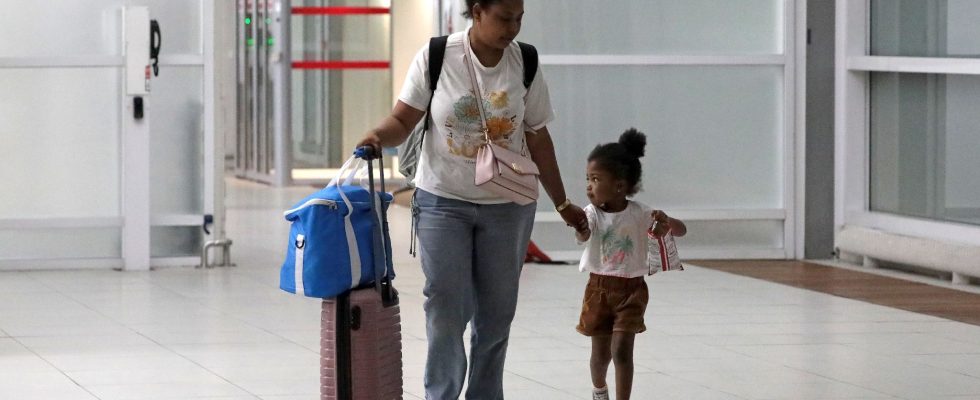On the terrace of an opulent café, a stone’s throw from the Paris Opera, Mohamed, dressed in his eternal sky blue boubou and a white turban, does not care about the curious looks of passers-by. Eyes riveted on the screen of his phone, this Nigerian jeweler watches for messages from his relatives, more than 3,000 kilometers away, in the region of Agadez, the historic city of northern Niger, at the gates of the desert. President Bazoum overthrown by the army, the threat of a regional military intervention, the closure of airspace, the rise in prices linked to economic sanctions… Blocked in Paris, the craftsman follows the latest news from his country, sad and helpless. “I want to go home, I’m afraid for my family, that they will run out of food and that war will break out,” worries Mohamed.
Like every summer for seventeen years, he criss-crossed the markets and festivals of Europe to sell his traditional silver jewelry when his country changed on July 26. His French visa almost expiring, he hopes to be able to leave with the next flight of Air Algérie, the last to operate in Niger with special repatriation planes authorized in dribs and drabs. Otherwise, “too bad”, he breathes, he will pass “by the road”. “Many Nigeriens try to cross the border from northern Benin by bus or canoe, but it’s risky and expensive,” said Mohamed.
Crossing the border by taxi, with the jihadist threat
On August 6, the junta closed its airspace in the face of the threat of a military operation by the Economic Community of West African States (ECOWAS) to free the ousted president, Mohamed Bazoum, and restore the constitutional order. In the process, Air France, the main operator between Europe and Africa, suspended its flights to Niger, without announcing a resumption date. A headache for Nigerians stuck in France.
Hadiza Kiari Fougou, a Nigerian geographer on a work assignment in Montpellier, couldn’t wait any longer. She preferred to change her ticket to reach N’Djamena, the capital of neighboring Chad, then cross the border by bush taxi to reach her city, Diffa, in southeastern Niger, despite the jihadist threat. Her journey by car lasted two days, during which she was crammed in the back with a dozen passengers, on a bumpy track, sometimes flooded, which could shelter here and there a mine hidden by the terrorists under an embankment.
“I was very scared, but it was the only solution, we had to sleep one night at the border and cross an area where Boko Haram often carries out kidnappings”, says this university professor by telephone, relieved to finally reunited with his family. But at home in the Diffa region, where nearly 300,000 people have fled the violence, she now fears a resurgence of attacks because of instability in Niger. “We are on the front line here, we have heard that jihadists have passed through neighboring villages in recent days,” says Hadiza Kiari Fougou, also concerned about the future of her students and her research programs in the event of a prolonged cut. French funding.
No more visas for France, until further notice
As in Mali, after the second army putsch in 2021, France suspended all its development aid and budget support actions in Niger and Burkina Faso, in a context of tensions between the ruling juntas and the former colonial power in the Sahel. Faced with the threat of a regional conflagration, while the putschists of Ouagadougou and Bamako threaten to retaliate in the event of intervention against the Nigerien junta, the Quai d’Orsay has also classified these three countries in the “red zone”, as “formally not recommended” for French nationals. The embassies have also suspended the issuance of visas on the spot, until further notice. A shock for young Sahelians who were to study in France at the start of the school year.
Maurice, studying law at Thomas-Sankara University in Ouagadougou, was due to leave on August 18 to follow a Master 2 at Paris-Nanterre University. “Everything was fixed, my ticket, my accommodation, all I needed was the visa… If it doesn’t unlock, it’s a lost year of procedure”, saddens the young man, who hopes to be reimbursed for the 100 000 CFA francs (about 150 euros) spent on registration fees and insurance. On its campus, the decision further stoked anger against French policy in the region. “We don’t understand, we are sanctioned for problems between countries, inevitably that creates resentment among young people, when we should rather strengthen exchanges to reconcile us”, adds the Burkinabe, who dreams of becoming “international lawyer” and to discover France, but regrets the progressive isolation of his country.
For binational families, the break between their two countries is sometimes experienced as a heartbreak. Hassane, a Nigerien married to a Luxembourg aid worker, had to pack up in a hurry to look for a new home in Cotonou, Benin, where his wife has been temporarily reassigned and where they will enroll their three children in French school, in waiting to see the evolution of the situation in Niger. “We are the lucky ones, we think of separated couples and all those who do not have the possibility of leaving, but it is difficult to be torn away overnight without knowing when we will see our country again, I feel like a refugee”, confides this logistician, who hopes to be able to manage his company in Niamey from a distance.
In Ouagadougou, too, many mixed families have deserted in recent months, after the violence against the French embassy. But some refuse to resign themselves. “The hardest thing is the uncertainty, there is not really any hostility against the French. Anyway, I have built my whole life here, insists a Frenchwoman who has lived for twenty years in Burkina Faso. . We learn resilience and how to live from day to day. Like the locals, after all.”
